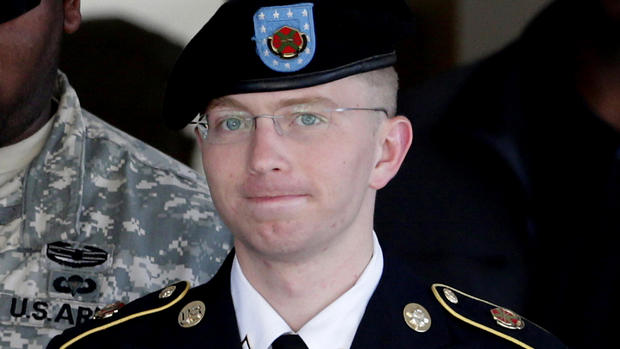Bradley Manning: I made noose after 2010 arrest
Updated at 5:22 p.m. ET
FORT MEADE, Md. As a military prosecutor held up a knotted bedsheet in court, Pfc. Bradley Manning acknowledged on Friday that he fashioned a noose and contemplated suicide shortly after his arrest on charges of engineering the biggest leak of classified material in U.S. history.
The pretrial testimony appeared to support the military's argument that it was trying to protect the former Army intelligence analyst from harming himself by keeping him in strict isolation, taking away his clothes and shackling him when he was outside his cell.
Manning's lawyers argue that the conditions he experienced for nine months at the Marine Corps brig in Quantico, Va., amounted to illegal punishment, lasting well past the time he was having suicidal thoughts, and that the charges against him should be dropped as a result.
Under cross-examination by prosecutor Maj. Ashden Fein, Manning was shown a peach-colored sheet that had been twisted into large knots. He testified that he fashioned the noose while being held in Kuwait soon after he was arrested and accused of leaking reams of secret military and diplomatic documents to the secret-spilling website WikiLeaks.
Manning, 24, said his time in Kuwait was the lowest he felt during his entire confinement.
"I certainly made a noose," the former intelligence analyst said. "The sheet noose in particular."
When he was transferred to the brig at Quantico in July 2010, he said, he wrote on his intake form that he was "always planning and never acting" upon suicidal thoughts. He was classified a suicide risk for eight days, then was upgraded to the less-restrictive "prevention of injury" status.
- Bradley Manning: I thought I'd die in custody
- Bradley Manning's proposed plea OK'd by judge
- Bradley Manning's lawyers: He's been punished enough
Manning maintains that neither designation was appropriate because he didn't feel like hurting himself after leaving Kuwait.
Quantico commanders maintained the extra restrictions despite repeated recommendations by brig psychiatrists that they be eased. Among other things, he was given scratchy, suicide-prevention bedding. Sometimes all his possessions, including his underwear and eyeglasses, were removed from his cell.
Manning testified Friday that he stood at naked attention for morning count one day in 2011 after a guard appeared to object to his use of a blanket to cover himself. He said he had been put on "suicide risk" the previous day after making a motion as if to hit himself in the head during a heated discussion with the brig commander about his confinement.
The testimony marked the first time military prosecutors went face-to-face with Manning in court.
The 5-foot-3 soldier looked youthful in his dark-blue dress uniform, close-cropped hair and rimless eyeglasses. He was animated, often speaking in emphatic bursts, swiveling in the witness chair and gesturing with his hands.
On Friday morning, as on previous days, there were more than a dozen Manning supporters in the courtroom.
The mood was lighter than on Thursday, the first time he spoke in public since his arrest in May 2010. Manning appeared relaxed on the stand and frequently smiled. He provoked laughter when he described his grading system for Quantico guards on weekly questionnaires: "decent" when he was unhappy with his treatment, "excellent" or "fine" otherwise.
Manning was an intelligence analyst in Baghdad in 2009 and 2010.
He is accused of sending WikiLeaks more than 250,000 diplomatic cables, classified memos, Iraq and Afghanistan war logs, Guantanamo Bay prison records and a 2007 video clip of a U.S. helicopter crew gunning down 11 men later found to have included a news photographer. The Pentagon said its troops mistook the camera equipment for weapons.
Manning is charged with offenses including violating espionage and computer security laws as well as aiding the enemy, which alone is punishable by up to life in prison.
He has offered to plead guilty to eight of the 22 charges against him, but the military judge presiding over the case has yet to decide whether to accept the plea. The government could still prosecute Manning on all counts.
